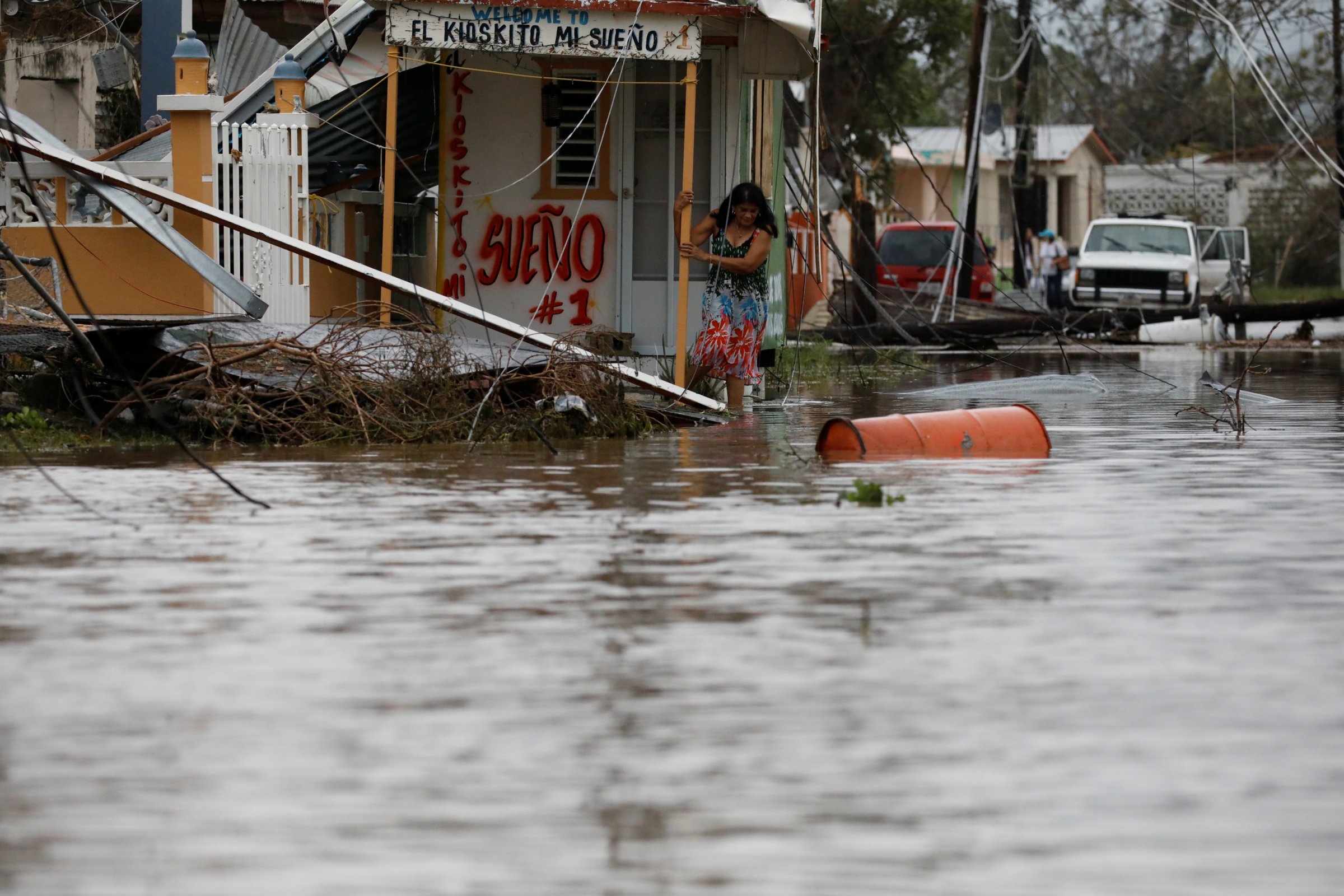Spiritual Sunday
The catastrophic devastation of Puerto Rico, into which our president has injected race politics, has me thinking of Noah’s flood and a poem by the great Syrian poet Adonis. As Adonis sees it, there is something wrong with a god who orders a flood, sparing only a few while drowning the rest of humanity. His poem can be read as a critique of religious tribalism and of tribalism generally. We cannot allow such thinking to enter into the Puerto Rican rescue and rebuilding effort.
We lucky survivors, the poet says, have “fasten[ed]/Our lives to the ropes of corpses filling the skies.” If we believe in a sky god that angrily metes out death to others, then we are defining our lives by “a fear of the Sun” and can only be pessimistic about the future:
In us, in our arteries, flows a fear of the Sun.
We despair of the Light,
We despair, Lord, of a tomorrow
In which to start Life anew.
Even though this God might protect us, such a future is no more than “an appointment with death.” Landing safely on Mount Ararat would be no more than seeing “this World, its Lord, and its Hell, twice over.”
Adonis is not rejecting God altogether. Rather, he is rejecting our reduced image of God, how we have shrunk Him to an angry sky god that smites our enemies. Adonis then goes about imagining a bigger god. He’s going to think of God as “something in between” earthly Clay and spiritual Ember, neither entirely of earth nor entirely of heaven. Rather than read cataclysmic disaster as divine retribution upon people who are not like us, the poet will go in search of “a different, a new, lord.”
In his search, the poet will not cling to the “familiar and pleasing despair” of the shores, which describes our current fatalistic existence. Rather, he will steer his ark into freezing waters and “remov[e]/clay and pebbles from the eyes of the dead.” We must leave behind comforting tribal certainties and “sail without giving in to our fears.” If our God is more that a compilation of our grievances–if our God is truly big–then we can return from the wilderness, emerge from the false reassurance of dark caves, and open the depths of our being to the timeless flood waters.
In the poem’s images of nautical exploration, I hear Lucille Clifton’s “blessing of the boats“:
may the tide
that is entering even now
the lip of our understanding
carry you out
beyond the face of fear
may you kiss
the wind then turn from it
certain that it will
love your back may you
open your eyes to water
water waving forever
and may you in your innocence
sail through this to that
Adonis’s elusive poem lends itself to multiple interpretations, including leaving behind religious habits that have become calcified while opening ourselves to new vision. The poet will awaken the spiritually dead, whose eye sockets are clogged by clay and pebbles. (“I had not thought death had undone so many,” writes T. S. Eliot in his own poem about a spiritual wasteland.) In the context of Puerto Rico, however, I think of the poem as white America emerging from its insularity and sailing over the waters to embrace inclusivity. We can refuse to be walled in by fears of the Other.
Today’s Old Testament reading is about Moses finding water in the wilderness, a passage only too relevant to the many Puerto Ricans who still lack clean drinking water. When we “open the depths of [our] being to the flood” and listen to the voice that whispers in our veins, we override what frightens us and step into a fuller vision of what is possible. The god of that vision, not the god of fearful Trump evangelicals, is the one I sail in search of.
A New Noah
By Adonis
Translated by Shawkat M. Toorawa
We travel upon the Ark, in mud and rain,
Our oars promises from God.
We live—and the rest of Humanity dies.
We travel upon the waves, fastening
Our lives to the ropes of corpses filling the skies.
But between Heaven and us is an opening,
A porthole for a supplication.
“Why, Lord, have you saved us alone
From among all the people and creatures?
And where are you casting us now?
To your other Land, to our First Home?
Into the leaves of Death, into the wind of Life?
In us, in our arteries, flows a fear of the Sun.
We despair of the Light,
We despair, Lord, of a tomorrow
In which to start Life anew.
If only we were not that seedling of Creation,
Of Earth and its generations,
If only we had remained simple Clay or Ember,
Or something in between,
Then we would not have to see
This World, its Lord, and its Hell, twice over.”
2
If time started anew,
and waters submerged the face of life,
and the earth convulsed, and that god
rushed to me, beseeching, “Noah, save the living!”
I would not concern myself with his request.
I would travel upon my ark, removing
clay and pebbles from the eyes of the dead.
I would open the depths of their being to the flood,
and whisper in their veins
that we have returned from the wilderness,
that we have emerged from the cave,
that we have changed the sky of years,
that we sail without giving in to our fears—
that we do not heed the word of that god.
Our appointment is with death.
Our shores are a familiar and pleasing despair,
a gelid sea of iron water that we ford
to its very ends, undeterred,
heedless of that god and his word,
longing for a different, a new, lord.


